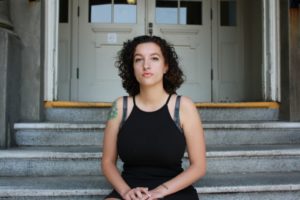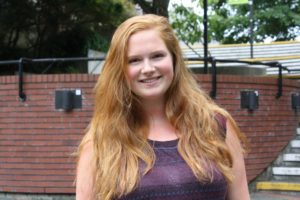10 years ago, I was sitting at the dining-room table with my stepmom, and I boldly proclaimed that I wasn’t a feminist. I can’t even remember what prompted me to make such a statement, but what I can remember is the reaction I received from the normally even-tempered accountant sitting across from me: she got angry. Real angry. And she demanded to know how I couldn’t support equality.
I was confused by her reaction—after all, feminists were irate man-haters who burned their bras, believed they were superior to men, and screamed at anyone who dared say anything disparaging against women, right? But this description was basically the complete opposite of my coolheaded stepmom.
I spent the next decade quietly grappling with the concept of feminism.
Fast-forward to October 2017: my Facebook feed was flooded by women proclaiming “me too,” and I was officially woke to how stacked the patriarchy actually was against women. In the ten months since, I’ve seen the conversation and definition of feminism evolve to the point where even my October 2017 concept of feminism as “women have been asking really nicely since the beginning of time and now we’re done asking nicely” seems archaic and narrow-minded.
So how do we discuss such a sensitive topic? How do people keep their cool when they feel marginalized? How do people not clap back when they feel unjustly attacked? How do we have an open dialogue about what feminists are fighting for without it turning into an actual fight?
I don’t know if there is a right answer to any of these questions. But I do know that the wrong answer is silence.
Defining feminism
One of the hardest things about the feminist movement is how to define it. While discussing this topic with five self-identifying feminist Camosun students, I got five different answers.
First-year Engineering Transfer student Kaila McCarthy says she’s not really sure what her personal definition of feminism is.
“I feel like it’s about equality,” she says. “I feel feminism is about intersectionality in feminism and making sure that everyone has equal rights and opportunities.”

Second-year University Transfer student Charlie Cleugh says that feminism is about equality across the board.
“I would probably say that it is a movement toward creating equality for all genders and sexes,” says Cleugh.
Legal Office Administration student Rowan Hynds thinks there is a lot of variety within the movement and subscribes to a belief in intersectional feminism.
“I’m also indigenous, and queer, and a bunch of other stuff, so that’s something that’s really important to me,” says Hynds. “Obviously the most succinct definition that everyone likes to fall back on is believing in the equality of men and women, but the feminism that I like to include in my own life and my own experience is a little bit more nuanced than that.”
As an international student from South Korea, second-year Applied Tourism and Hospitality student Jinnie Park says that gender roles are more rigid in Asian culture. She admits she doesn’t feel like a “perfect feminist” because she’s still learning about the complexities of the issue.
“Feminism is a belief that men and women have the same rights for everything,” she says, “so women can be much freer from any prejudice or any violence.”

The definition of feminism is simple for second-year University Transfer student Taelor Lay.
“Equality,” she says. “Period. One word.”
Feminism on campus
Camosun College lists “positive and supportive student experiences,” “an inclusive community,” “an environment of respect and safety for all,” “our relationships with one another,” and “Indigenization” among its values on the college website. Cleugh and Lay both say that they feel Camosun is doing a good job encouraging and supporting feminism on campus. Both have taken classes with a strong female influence and found the experience to be enriching.
“Last semester I took a course called Anthropology of Women and we did a lot of work in that class about women’s issues,” says Cleugh. “There was a section about sex work and the legalities of that, and should it be legal, and women’s rights surrounding that. I think it was just a really enriching experience and it really opened my eyes to a lot of things, and I think it did to a lot of other people in the class too.”
Lay has taken classes that aren’t specifically described as “women’s literature,” but has high praise for her profs who have included books written by women in their curricula.
“I’ve had a lot of amazing profs. Maureen Niwa, specifically, has encouraged me to delve into women’s lit,” says Lay. “It’s definitely a passion of mine. I don’t know how much I’ll be able to pursue it, but I would love to inspire others, in the way that Maureen and some of the other profs have done for me, when I’m a high-school teacher.”

Lay is also incredibly grateful for the support she received from the college after surviving sexual assault last year. Lay was impressed by how understanding and supportive her profs were as she recovered, and by how many resources were available to her as a Camosun student, even though the incident occurred off campus.
“The systems that they have in place to support students that way have made me feel very supported as a woman, as a feminist, and as a sexual-assault survivor,” says Lay. “I feel so supportive of Camosun because of what they have in place to support sexual assault victims with in their recovery.”
Lay says that resources such as the school’s student support workers have been instrumental in her recovery.
“I didn’t know how much support there was available until recently, but once I was aware of the full extent of the support that was available to me, it was extremely easy [to access it]. The people who are employed to help students are truly there to help.”
Although people I spoke with for this story generally praised Camosun’s support of feminism on campus, Hynds finds that her older profs, in general, tend to be slightly less sensitive to her beliefs.
“As society evolves, people accept different ideas about what feminism is, and what the appropriate way to treat different genders are, and all that kind of stuff,” she says.

All of Hynds’ classes are at the Interurban campus; she believes the campus culture there is less inclusive than at Lansdowne. While she acknowledges that she’s had many positive experiences with Interurban staff, she would like to see them have a bit more sensitivity training, especially when it comes to issues about intersectionality and different cultures.
“I think some of them are working with information or ideas that are a little bit outdated,” she says. “Or, a lot of the time, I feel like some of them are so concerned about walking on eggshells, or ‘I don’t want to say the politically incorrect thing,’ and they end up showing how uncomfortable they are around minority issues.” (A spokesperson for the college said no one from Camosun was available to comment on this issue, but they stressed that if any students need assistance they can contact the Ombudsperson or the Student Support Office; the college is also in the process of developing its Equity, Diversity, and Inclusion Policy and Procedures, which students are welcome to participate in.)
Despite her concerns, Hynds is quick to point out something that could have been a negative experience but turned out to be a positive one for her.
“In my first semester, I had a professor who was kind of telling this story about a scientific study about the differences in how men and women think, and saying, ‘Oh, it makes sense that women can’t control their logical processes as well as men can because of this scientific fact.’”
Hynds then remembered that she had a book at home that referenced this particular study and gave contrary information to what her prof was saying.
“There was a whole bunch of information that was kind of incongruent with the findings of that study in particular,” she says, “so I highlighted it and brought it into his office and was just kind of like, ‘Hey, I just think we should be looking at all sides of this, making sure that the information is current, and sensitive, above all.’”
In the end, Hynd says her prof was open to her findings and thanked her for bringing her concerns to his attention.
“He was like, ‘I really appreciate that. I don’t want to be giving people wrong information, and obviously studies go in and out of favour, so thank you for correcting me,’ which was something that I really appreciated, and he ended up reading the whole book,” says Hynd.
For McCarthy, being one of the few female students in the male-dominated Engineering Transfer program has been a mixed-bag experience. While she admits that feminism isn’t something that is readily discussed in her classes and that she hasn’t had a negative or marginalizing experience at Camosun, she does want to point out that the anonymity of the internet can tell a different story.
“When it comes to the teachers, there’s one thing that I noticed,” she says. “On Rate My Profs—which is definitely something I’ve seen my classmates look at, and I’ve looked at—there is an emphasis on female teachers’ appearance, whereas a lot of times when people are looking at male teachers, or evaluating male teachers, they’re talking about their skills in the classroom. I’ve definitely heard discussions about the attractiveness of female teachers.”
Park also feels the pressure of gender stereotypes, recalling a time when she brought food to campus and her male classmates commented on her societal role based on how good the meal tasted.
“They said, ‘Oh, you’re ready to get married, you’re gonna be a good wife,’” she says.
Park says she doesn’t appreciate those kinds of comments because they make her feel the cultural pressure to be a housewife.
“I’m gonna get married just to cook for my husband?” she says.
When confronting her classmates, Park struggles with their dismissiveness.
“When I say, ‘I don’t like to hear that kind of thing, that’s not fair,’ they always say, ‘Hey, it’s a compliment, why are you so serious?’ I hate that.”
Fighting stereotypes
It’s important to note when involved in the ever-changing dialogue about feminism that there’s still a lot of stigma surrounding the movement.
“I find, no matter who you’re talking to—even with friends—I feel the need to almost back it up and explain, ‘Oh, I’m not an angry feminist, I’m not the feminist that’s rioting with her shirt off. I’m not a feminist you should be wary of; I’m not a feminist who can’t make jokes,’” McCarthy says. “You always feel like you have to put people’s minds at ease when you use that word.”

Park says that there has been some culture shock for her in regards to feminism.
“Here in Canada, I can say, ‘I’m a feminist,’ but in Korea the word ‘feminist’ is not a good word,” she says, adding that “many men think ‘feminism’ equals ‘anti-men.’”
While some stigmas, such as the incorrect assumption that feminists are all man-haters, may be obvious, there are more complex ones that can make owning feminist views challenging.
“When people say they’re a feminist, I get worried that it’s not intersectional feminism, and that I’m going to be associated with ‘white feminism’—the kind of feminism that only kind of helps white women and straight women, women who are already privileged in society,” says Cleugh. “That kind of feminism really irks me because it’s not really doing anything. These women are already privileged in society… sure, there’s gender equality, but there are so many trans women, queer women, women of colour that are so marginalized that I think it’s very important that we include that. Sometimes when I say that I’m a feminist, I worry that I’m getting looped into the blanket ‘Feminism is just about white women aren’t paid as much as men.’ And then it’s like, ‘Okay, well, have you looked at how trans women don’t even get hired?’”
McCarthy echoes Cleugh’s statement, adding that there are so many different kinds of people, with so many different beliefs, who identify as feminists.
“For me, feminism is about intersectionality, and people of all genders, all ages, all sexes, religions, sizes are treated equally and respected. But there are people who really put limitations on who they think deserve to be treated equally, so it’s hard,” says McCarthy. “I think, in a way, you do need to clarify what you mean when you say you’re a feminist to assert that you aren’t—particularly for me as a white woman—just saying you want rights for white women. You know, you want to see black women and aboriginal women treated equally, and to recognize that white women are still in a place of privilege, even as women.”
Cleugh says that the most important thing to consider when discussing feminism is the idea that there are more than two genders.
“Sex and gender is not this binary thing,” says Cleugh. “I feel like we go into conversations so many times not acknowledging that and the conversation gets muddled in this debate about whether there is or there isn’t [a gender binary].”
Cleugh says then conversation gets away from the concerns of people who identify as nonbinary or intersex.
“I feel like if we don’t acknowledge the fluidity of sex and gender, we get caught in the first stage and we can’t go past that,” says Cleugh.
Hynds accepts that while feminism is becoming more normalized there is always going to be a certain stigma attached to it.
“Above all, I really wish that, especially with the topic of intersectionality, people would recognize that no one is demonizing anybody,” she says. “It’s not saying ‘You can never have anything bad happen to you because you’re a man,’ or you’re white or whatever it is, but simply that those things won’t happen to you purely for the fact that you have this identity. Bad things aren’t happening to men specifically because they are men—they might be happening to men because they’re black, or they’re poor, or what have you, but I think that nuance needs to be communicated and understood a little bit more thoroughly.”
Lay wishes that people were better able to focus on equality rather than on the social stigmas and implications that are attached to the word “feminism.”
“I think that is where the defensiveness comes in,” she says. “If I said I was a supporter of equality I don’t think anyone would bat an eye at me, but it does happen every now and again when you say ‘feminism,’ although it is essentially the same thing as equality.”
The reality is that feminism is constantly evolving, and it’s hard to not feel overwhelmed by it all. In a world where people are so passionate in their beliefs, it’s easy to not ask the hard questions for fear of coming across as ignorant, close-minded, or bigoted. But that doesn’t mean we shouldn’t discuss it.
As a student, I am constantly evolving and learning things that I never knew before. I like to think these revelations have enriched my life, expanded my views, and allowed me to look at the world critically. As a feminist, all I can do is be humble enough to know that I am still learning.
I came into this article feeling ready to crush the patriarchy, and I am walking away from it awake enough to realize there are many different facets of feminism.
And, while we may all choose to add our own layers and nuances to our definitions and beliefs, it is important to focus on the fact that there’s still a dialogue that needs to occur in order for society to achieve the ultimate goal of equality.
